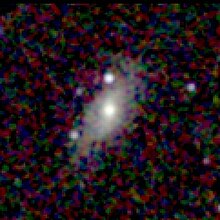NGC 21
Appearance
| NGC 21 | |
|---|---|
 NGC 21/NGC 29 (Sloan Digital Sky Survey) | |
| Observation data (J 2000.0 epoch) | |
| Constellation | Andromeda |
| Right ascension | 00h 10m 46.9s[1] |
| Declination | +33° 21′ 10″[1] |
| Redshift | 0.015911[1] |
| Heliocentric radial velocity | 4770 ± 4 km/s[1] |
| Distance | 234 ± 29 Mly (71.7 ± 8.9 Mpc)[2] |
| Apparent magnitude (V) | +12.8 |
| Absolute magnitude (V) | -20.75[3] |
| Characteristics | |
| Type | SAB(s)bc |
| Apparent size (V) | 1,2′ × 0,59′ |
| Other designations | |
| NGC 21, UGC 100, PGC 767. | |
NGC 21 (also known as NGC 29) is a spiral galaxy in the Andromeda constellation. It was discovered by William Herschel in 1790. Lewis Swift observed it again in 1885, leading to its double listing in the New General Catalogue.

References
- ^ a b c d "NASA/IPAC Extragalactic Database". Results for NGC 0021. Retrieved 2010-05-03.
- ^ "Distance Results for NGC 0021". NASA/IPAC Extragalactic Database. Retrieved 2010-05-03.
- ^ "The galaxy NGC 21".
External links
